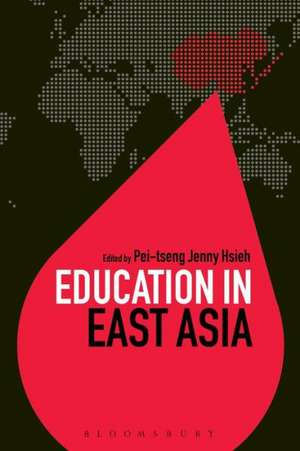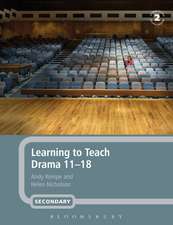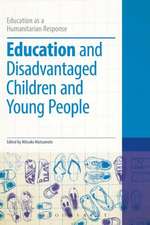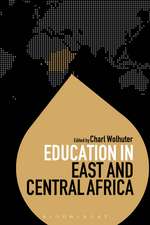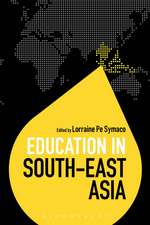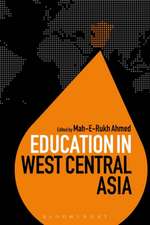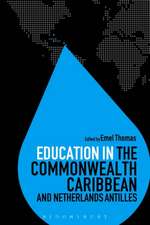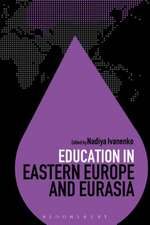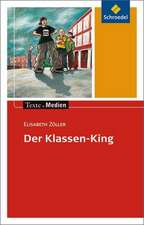Education in East Asia: Education Around the World
Editat de Dr Pei-tseng Jenny Hsieh Dr Colin Brocken Limba Engleză Hardback – 22 mai 2013
| Toate formatele și edițiile | Preț | Express |
|---|---|---|
| Paperback (1) | 315.17 lei 3-5 săpt. | |
| Bloomsbury Publishing – 23 sep 2015 | 315.17 lei 3-5 săpt. | |
| Hardback (1) | 814.22 lei 6-8 săpt. | |
| Bloomsbury Publishing – 22 mai 2013 | 814.22 lei 6-8 săpt. |
Din seria Education Around the World
- 8%
 Preț: 313.74 lei
Preț: 313.74 lei - 8%
 Preț: 315.17 lei
Preț: 315.17 lei - 8%
 Preț: 315.17 lei
Preț: 315.17 lei - 7%
 Preț: 320.85 lei
Preț: 320.85 lei - 7%
 Preț: 320.85 lei
Preț: 320.85 lei - 18%
 Preț: 315.33 lei
Preț: 315.33 lei - 18%
 Preț: 315.17 lei
Preț: 315.17 lei - 13%
 Preț: 256.12 lei
Preț: 256.12 lei - 37%
 Preț: 914.95 lei
Preț: 914.95 lei - 13%
 Preț: 316.11 lei
Preț: 316.11 lei - 8%
 Preț: 319.44 lei
Preț: 319.44 lei - 8%
 Preț: 316.11 lei
Preț: 316.11 lei - 8%
 Preț: 315.17 lei
Preț: 315.17 lei - 8%
 Preț: 316.11 lei
Preț: 316.11 lei - 37%
 Preț: 187.87 lei
Preț: 187.87 lei - 43%
 Preț: 631.21 lei
Preț: 631.21 lei - 43%
 Preț: 727.31 lei
Preț: 727.31 lei - 43%
 Preț: 631.21 lei
Preț: 631.21 lei - 44%
 Preț: 187.30 lei
Preț: 187.30 lei - 37%
 Preț: 910.69 lei
Preț: 910.69 lei - 37%
 Preț: 917.83 lei
Preț: 917.83 lei - 37%
 Preț: 912.59 lei
Preț: 912.59 lei - 37%
 Preț: 916.85 lei
Preț: 916.85 lei - 36%
 Preț: 172.36 lei
Preț: 172.36 lei - 36%
 Preț: 171.32 lei
Preț: 171.32 lei - 12%
 Preț: 234.20 lei
Preț: 234.20 lei - 8%
 Preț: 318.95 lei
Preț: 318.95 lei
Preț: 814.22 lei
Preț vechi: 1290.94 lei
-37% Nou
Puncte Express: 1221
Preț estimativ în valută:
155.80€ • 162.67$ • 128.94£
155.80€ • 162.67$ • 128.94£
Carte tipărită la comandă
Livrare economică 05-19 aprilie
Preluare comenzi: 021 569.72.76
Specificații
ISBN-13: 9781441140098
ISBN-10: 1441140093
Pagini: 336
Dimensiuni: 156 x 234 x 23 mm
Greutate: 0.43 kg
Ediția:New.
Editura: Bloomsbury Publishing
Colecția Bloomsbury Academic
Seria Education Around the World
Locul publicării:London, United Kingdom
ISBN-10: 1441140093
Pagini: 336
Dimensiuni: 156 x 234 x 23 mm
Greutate: 0.43 kg
Ediția:New.
Editura: Bloomsbury Publishing
Colecția Bloomsbury Academic
Seria Education Around the World
Locul publicării:London, United Kingdom
Caracteristici
Authoritative handbook to education in East Asia today, written by leading international education experts.
Notă biografică
Pei-tseng Jenny Hsieh is a researcher in the Department of Education at the University of Oxford, UK. Previously, she has been an education consultant in Europe, Sub-Saharan Africa and India.
Cuprins
Series Editor's Preface, Colin Brock (University of Oxford, UK)The ContributorsIntroduction: Education in East Asia - A regional Overview, Pei-tseng Jenny Hsieh (University of Oxford, UK)1. China: An Overview, Zhou Zhong (Tsinghua University, China)2. China: The Role of Independent Colleges in the Expanding Higher Education System, Kai Yu (Shangai Jiao Tong University, China) and Hubert Ertl (University of Oxford, UK)3. Hong Kong: Structuring the Education System for a Diversified Society, Alka Sharma (University of Hong Kong)4. Macao: Governmentality and Education Development in the Post-1999 Era, Sou-Kuan Vong (University of Macau, China)5. Japan: Cultural Roots versus Systemic Provision, Shin'ichi Suzuki (Waseda University, Japan)6. Japan: Internationalisation in Education and the Problem of Introspective Youth, Yuki Imoto (Keio University, Japan)7. Japan: A Silent End to a Silent Revolution? Post-war Changes in Resource Allocation, Takehiko Kariya (Nissan Institute of Japanese Studies, Japan, and the University of Oxford, UK)8. Mongolia: From Nomadic to Communistic to Liberal, Enkhzul Dambajantsan (University of the Humanities, Mongolia)9. North Korea: An Overview, Jeong-ah Cho (Korea Institute for National Unification, North Korea), Huang-kue Lee (Hanyang University, South Korea), and Ki-Seok Kim (Seoul National University, South Korea)10. South Korea: Education in a Multicultural Society, Jiyeon Hong (Kyungmin College, South Korea)11. South Korea: College Admissions System and Reform Issues, Soojeong Lee (Dankook University,, South Korea) and Eul Sook Kim (Seoul National University, South Korea)12. Taiwan: Trends and Agendas in Education Reform, Hsiao-lan Sharon Chen (Taiwan Normal University in Taipei, Taiwan)13. Taiwan: Examinations, Pei-tseng Jenny Hsieh (University of Oxford, UK)Index
Recenzii
The rapid emergence of 'big data' in education has sparked a renewed interest in international comparisons; and the relationship between educational investment and inclusive growth in East Asia is of enormous current interest to academics, policy-makers, and the international donor community. But it is not often that big data provides the big picture. For that we require richer analyses and insights woven together from across many disciplines in the social sciences. This book, so skilfully edited by Pei-tseng Jenny Hsieh, does precisely that. It is a must read for all students in comparative education and interdisciplinary area studies.
